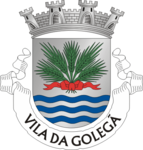Golegã (European Portuguese pronunciation: [ɡulɨˈɣɐ̃] ⓘ) is a town and municipality in Santarém District, Portugal. The population of the municipality in 2011 was 5,913,[1][2] in an area of 84.32 km².[1][3]
Golegã | |
|---|---|
 | |
 | |
| Coordinates: 39°24′N 8°29′W / 39.400°N 8.483°W | |
| Country | |
| Region | Oeste e Vale do Tejo |
| Intermunic. comm. | Lezíria do Tejo |
| District | Santarém |
| Parishes | 3 |
| Government | |
| • President | José Tavares Veiga Silva Maltez (PS) |
| Area | |
• Total | 84.32 km2 (32.56 sq mi) |
| Population (2011)[1] | |
• Total | 5,913 |
| • Density | 70/km2 (180/sq mi) |
| Time zone | UTC+00:00 (WET) |
| • Summer (DST) | UTC+01:00 (WEST) |
| Local holiday | Ascension Day (date varies) |
| Website | www |
The present Mayor is Rui Manuel Lince Singeis Medinas Duarte, elected by the Socialist Party. The municipal holiday is Ascension Day.
Historical sights
editThe main historical sight of Golegã is its main church Igreja Matriz da Golegã, built in the early 16th century in Manueline (Portuguese late Gothic) style. The remarkable main portal and the ribbed vaulting inside the main chapel are its most important artistic features. Near Golegã village is located the Quinta da Cardiga, a manor house with its origin in a 12th-century donation to the Knights Templar. Originally the site of a castle, the property was remodelled in the 16th century into a Renaissance rural palace.
Geography
editParishes
editAdministratively, the municipality is divided into 3 civil parishes (freguesias):[4]
- Azinhaga
- Golegã
- Pombalinho
Population
edit| Population of Golegã municipality | ||||||||
|---|---|---|---|---|---|---|---|---|
| 1801 | 1849 | 1900 | 1930 | 1960 | 1981 | 1991 | 2001 | 2011 |
| 2452 | 2866 | 5694 | 6325 | 6150 | 5963 | 6072 | 5710 | 5913[1] |
Economy
editThe main agricultural productions in the municipality are maize and Beta vulgaris. The area is a reputed animal breeding center and an internationally renowned cattle and horse market. Golegã is considered the capital of the horse (Capital do Cavalo), and it has been the site for the gathering of breeders since at least the 18th century. Two fairs take place every November in Golegã: The Feira Nacional do Cavalo (National Horse Fair) and the Feira Internacional do Cavalo Lusitano (International Lusitano Horse Fair), dedicated to the Pure Blood Lusitano.
Notable persons
edit- Carlos Relvas (1838 in Golegã – 1894) a wealthy landowner and amateur bullfighter.
- José Relvas (1858 in Golegã – 1929) a politician and 70th Prime Minister of Portugal in 1919.
- José Saramago (1922 in Azinhaga – 2010) writer, the winner of the 1998 Nobel Prize in Literature.
- Manuel Bento (1948 in Golegã – 2007) football goalkeeper with 63 caps for Portugal including participation in the 1984 UEFA European Football Championship and the 1986 FIFA World Cup as well as 324 club caps, mainly for S.L. Benfica.
References
edit- ^ a b c d including the parish Pombalinho, that changed from the municipality of Santarém to Golegã in 2013
- ^ Instituto Nacional de Estatística
- ^ "Áreas das freguesias, concelhos, distritos e país". Archived from the original on 2018-11-05. Retrieved 2018-11-05.
- ^ Diário da República. "Law nr. 11-A/2013, page 552 53" (pdf) (in Portuguese). Retrieved 23 July 2014.
External links
edit- Municipality official website
- Feira da Golega.com
- (in French) Feira nacionale do cavalo (photo reporting) Archived 2016-10-06 at the Wayback Machine
- Photos from Golegã

